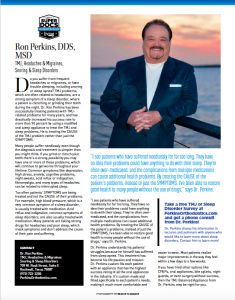2017 Dementia RiskPlease read the article from the recent issue of the journal Neurology (by the American Academy of Neurology)
Author: Admin
Please watch or set your DVR to record “American Health Front” on Saturday, August 5, 2017 at 6:30-7:00 pm on KTVT-TV CBS Channel 11.
Writing in the Aug. 22 issue of the global online journal Public Library of Science Medicine, John Hopkins investigators say they compared 19 children with severe obstructive sleep apnea to 12 children without the disorder and identified brain changes between the two groups. Next, they were able to link the changes in the two brain structures to deficits in neuropsychological performance, such as attention, learning, and working memory.
They concluded: “This should be a wake-up call to both parents and doctors that undiagnosed or untreated sleep apnea might hurt children’s brains.”
Summary of an article in Baylor Innovations, Volume 9 No. 3 (Fall 2015):
Recent research from the Alzheimer’s Disease Neuroimaging Initiative concluded that individuals with sleep disordered breathing issues could see signs of memory loss earlier in life. Study participants with sleep disordered breathing problems saw mild cognitive decline at an average age of 77, compared to an average age of 90 for those with no sleep breathing issues.
Snoring in children is a sign that their airway is partially obstructed during sleep. This can prevent normal sleep, cause serious fatigue during the day, impair growth and lead to a lower quality of life. Many studies have been performed indicating a significant correlation between sleep disorders in children and behavioral issues. Children who do not sleep well, may complain of morning headaches, be irritable, have difficulty concentrating, exhibit hyperactivity or act impulsively. Many classic symptoms of ADHD are often exhibited in children with sleep disorders. The good news is that there is treatment which can improve your child’s quality of life. Take the survey under Sleep Disorders in Children and you will get a telephone consultation by Dr. Perkins.
If you are suffering from regular headaches, Dr. Ron Perkins can help!
Many headaches are created by night time clenching or grinding and are directly related to small muscles involved with the TMJ (jaw joint). Having a good bite or wearing a night guard or splint can help a little, but does not really solve the problem. Dr. Ron Perkins has been able to combine treatment of sleep problems with treatment of the jaw joint or TMJ, and the results have been phenomenal! Dr. Perkins has had tremendous success in treating all types of headaches and helps his patients sleep without clenching and grinding. Very few doctors have made the connection between TMJ problems and sleep. By treating both TMJ and sleep at the same time, Dr. Perkins’ success rate of making patients better has skyrocketed! Dr. Perkins is passionate about helping patients with these issues – he can often improve “90% of their heachaches 90% of the time”, as he explains to his patients. With a thorough exam, which includes a comprehensive evaluation of the teeth, gums, throat, bite, TMJ and sleep habits, Dr. Ron Perkins can tell you whether or not his treatment can help. His diagnosis by symptoms (Perkins Sleep Symptom Profile – PSSP), has proven extremely accurate in diagnosing such problems.
If you, or your loved ones want to get rid of headaches, high blood pressure, acid reflux, insomnia, and many other health problems, you should be examined by Dr. Ronald Perkins of Perkins Orthodontics, Sleep Disorders & TMJ in Dallas or Rockwall, Texas.
If you snore, you may have a sleep disorder. It may not be sleep apnea, unless you snore and stop breathing repeatedly. Snoring is the most important sign that you are seriously damaging your health every single night. You are not getting quality sleep because your sleep cycle is being repeatedly interrupted throughout the night. Dr. Ronald Perkins can help with an easy, nonsurgical way – a custom made oral appliance.
However, if someone has told you that you stop breathing, which is very easy to tell when you snore and stop abruptly, you do have sleep apnea. Often this condition can be treated by Dr. Ronald Perkins using an oral appliance which you wear while you sleep.
Do yo have indigestion and/or acid reflux? This is a common symptom of sleep disorders. When your sleep is interrupted, you have a stress response because you have a temporary obstruction in your throat and you are literally sucking acid up from your stomach. Also, your diaphragm is contracting and pushing upward. It is the perfect storm of peptic acid forced up into your throat and airway, which further complicates the problem by causing inflammation and swelling in your throat.
Dr. Ronald C. Perkins has helped many of his patients get off the acid reflux medication.


